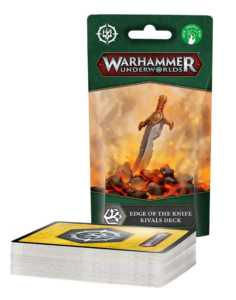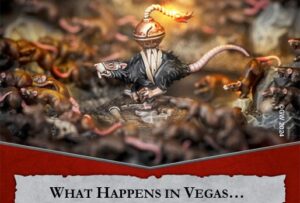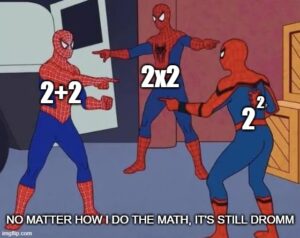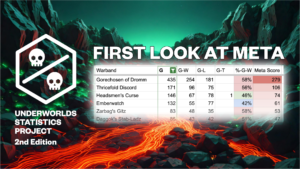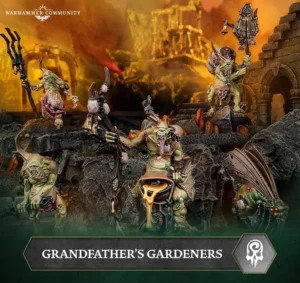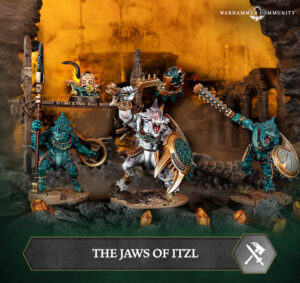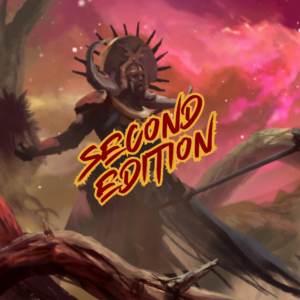Intro
Welcome back to another Path to Glory deck review! In this article, I’ll be covering the Flex archetype deck from Embergard: Pillage and Plunder. As defined by GW, Flex is a mix of two or more playstyles, requiring you to consider both combat and control equally, with a risk vs. reward style of play. As usual, I will be rating each card from 1 to 3 along three separate measures: power, consistency, and universality. In simple terms, Power refers to the peak output of the card – how impactful it is when played at the right time. Consistency refers to how often the time is right to play the card, or how often you can play it for its full power. Universality measures how broadly applicable the card is, whether it works with a variety of warbands or playstyles or if it is likely to work only with more niche strategies. In the new edition this is the metric which may be hardest to gauge, of course.
Objectives
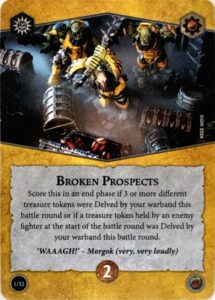
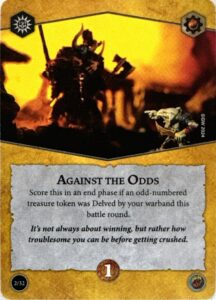
Broken Prospects
Starting off strong, this objective offers two ways to complete it and both are a fair effort for the payout. While delving 3 treasure tokens means you have to spend at least some time moving around, the fact that this is doable by simply moving from token to token and delving (as now you can delve even while staggered) makes this substantially easier than other objectives that might require 3 tokens, since you can complete this even with only 1 or 2 surviving fighters. The alternative condition in many ways exemplifies flex play, rewarding you for taking a token away from an enemy, although you can only score it in this way in round 2 or 3.
Power: 2
Consistency: 3
Universality: 2
Against the Odds
Continuing with the theme of delving, this is another fair and good end phase, especially because again it doesn’t care about where your fighter is at the end of the round, only that you at some point managed to land on one of those odd numbered treasure tokens and delve.
Power: 2
Consistency: 3
Universality: 3
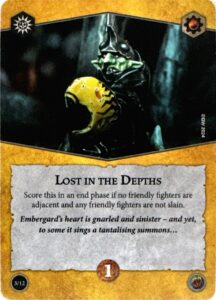
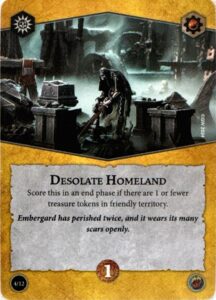
Lost in the Depths
Continuing the grand tradition of vaguely-unclear wording, I’ll be interpreting this card as requiring no friendly fighters being adjacent to other friendly fighters, and that there is at least 1 surviving friendly fighter. In that interpretation, its a very consistent and trivial end phase indeed.
Power: 2
Consistency: 3
Universality: 3
Desolate Homeland
The first end phase we are seeing with more significant counterplay available, this can be scored by default in certain matches where the treasure tokens are set up in that way, but otherwise will require you to do what you were already incentivized to do: delve one or more of your treasure tokens. At least this time, in theory, your opponent could delve them back, but that is easier said than done.
Power: 2
Consistency: 3
Universality: 3
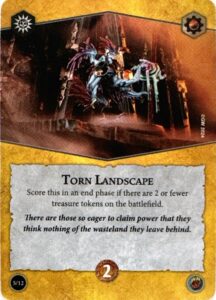
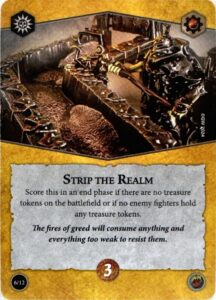
Torn Landscape
A more difficult objective, this requires you to delve at least 3 tokens and keep them delved, which canny opponents may be able to deny. Still, it is aligned with the rest of your scoring and playing to deny this might force your opponent to adjust away from their own preferred plan.
Power: 2
Consistency: 2
Universality: 2
Strip the Realm
The hardest objective in the deck, but also the biggest reward! Delving all 5 treasure tokens is likely to be extremely difficult, as is denying your opponent any treasure tokens at all. There are ways, however, and this may prove to be a strong card against elite warbands that would otherwise prefer to aggressively chase your fighters rather than stand on tokens.
Power: 3
Consistency: 1
Universality: 2
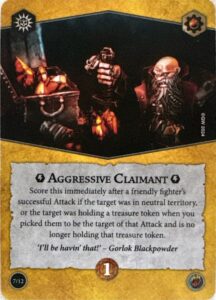
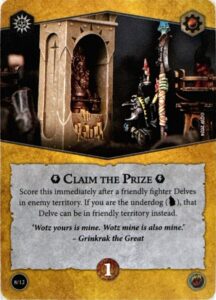
Aggressive Claimant
The sort of surge I don’t love, requiring a successful attack, but thankfully the conditions aren’t too restrictive. The first is fairly dependent on your opponent’s positioning, but the second is almost certainly something you’ll want to/need to do throughout the game.
Power: 2
Consistency: 2
Universality: 3
Claim the Prize
As we saw from the end phases, delving is the name of the game for this deck, and delving a token in enemy territory isn’t an especially difficult task. Being able to delve in friendly territory instead while you are the Underdog is just gravy on top.
Power: 2
Consistency: 3
Universality: 3
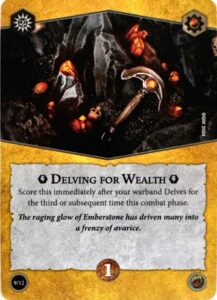
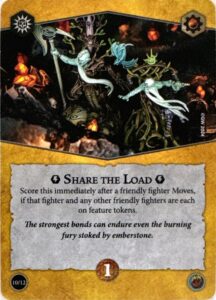
Delving for Wealth
Delving 3 times is something we already need to do for at least 2 of our end phases, and this doesn’t care where they are, so in a pinch you can delve the same token back and forth over the course of 3 power steps.
Power: 2
Consistency: 3
Universality: 2
Share the Load
Essentially a slightly more restrictive version of surge: hold two treasure tokens as we’ve seen before, this is a consistent workhorse. Not a lot to say except that it is a bit unfortunate you can’t score this freely once you’ve already gotten yourself onto 2 tokens if you draw into it, or push onto those tokens with warscroll abilities or power cards.
Power: 2
Consistency: 3
Universality: 3
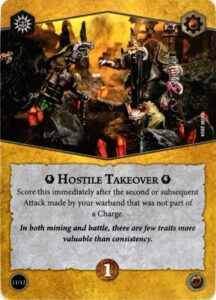
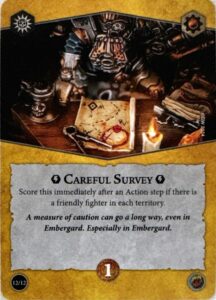
Hostile Takeover
This is interesting design space, demanding that we make attack actions without charging. This is more rewarding to warbands with range 2 melee or multiple ranged attacks, and might be positionally difficult as well.
Power: 2
Consistency: 2
Universality: 1
Careful Survey
This surge is deceptively simple; requiring fighters to be in all 3 territories means you must have 3 fighters alive and also get them spread out. While its not impossible and some warbands with movement shenanigans may find it more trivial, in general it’s a bit more difficult as you lose fighters throughout the game.
Power: 2
Consistency: 1
Universality: 1
Ploys
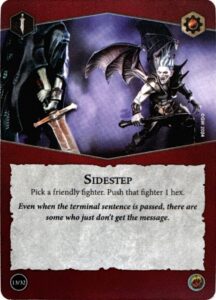
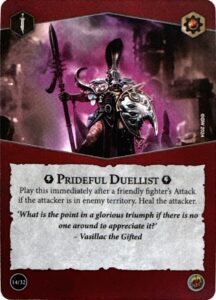
Sidestep
A long-time staple, pushing a fighter at will will never be bad. Not much to say, this card can help you do almost anything.
Power: 2
Consistency: 3
Universality: 3
Prideful Duellist
This card demands a lot to just heal 1 damage off of a fighter who is in a dangerous position, but there are times it will be clutch to keep your fighter alive through one more hit.
Power: 2
Consistency: 2
Universality: 1
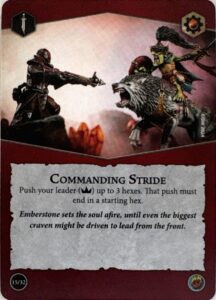
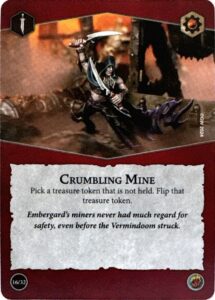
Commanding Stride
Another classic, this card will help you get your leader into the fight or out of danger. While less leader-centric warbands may be less excited by it, its still very strong.
Power: 3
Consistency: 3
Universality: 2
Crumbling Mine
It is important to note that flipping a treasure token is not the same as delving it, so while this can help you score things for there being few or no treasure tokens in a territory, it does not synergize with many of the objectives in this deck.
Power: 1
Consistency: 1
Universality: 2
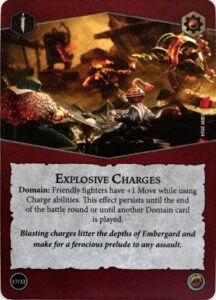
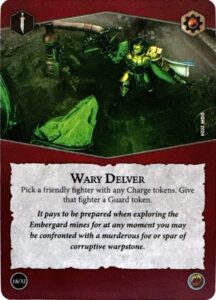
Explosive Charges
Getting a little further with your fighters is always a good thing, and the fact that this can last all round and help you reach those distant tokens (as long as you can charge) is great. It also is just solid synergy for more aggro-focused styles with this deck.
Power: 2
Consistency: 3
Universality: 3
Wary Delver
Guard tokens are good; only being able to give it to a fighter with a charge token is less good, but still solid. Combined with the general token-centric nature of the deck and the Flex tag, we begin to see where the aggro half of the deck is intended to be charging onto those tokens.
Power: 2
Consistency: 2
Universality: 3
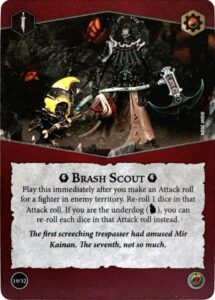
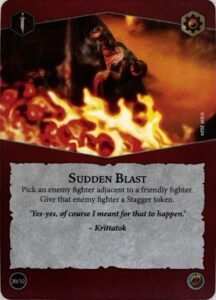
Brash Scout
A single offensive re-roll would normally be fairly unexciting, but the fact that you only play this when you see that you can use the re-roll is better, and the underdog perk of re-rolling all your dice takes the cake. You can only use this when you are attacking while in enemy territory, but if you plan to take the fight to the enemy, that is a given.
Power: 2
Consistency: 3
Universality: 2
Sudden Blast
It is always nice when your opponent is staggered, but the key issue I have with this card is that if I’m next to an enemy, usually I got there by charging, and I want them to be staggered before I charge into them, not after. Also, usually if I’m charging someone, I want to drive them back, not leave them in place just so I can stagger them.
Power: 2
Consistency: 2
Universality: 2
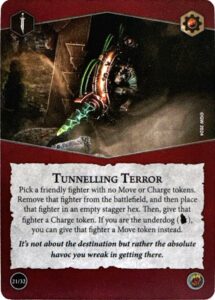
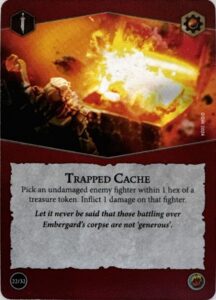
Tunneling Terror
Teleports are always good; teleporting to a stagger hex is a little more niche but still potentially useful, and there are times where gaining a charge token “by surprise” as it were, could be useful. The underdog perk lets us give the fighter a move token instead, which may let us teleport and then begin plinking away with ranged attacks or just move afterwards to reach a distant token.
Power: 3
Consistency: 3
Universality: 3
Trapped Cache
The caveat that the enemy is undamaged is a fairly harsh restriction but still leaves this card very, very useful. Early game this may let you have your pick of enemy fighters to soften up, and late game if every enemy is damaged you are already happy about that.
Power: 2
Consistency: 2
Universality: 3
Upgrades
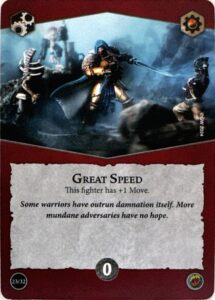
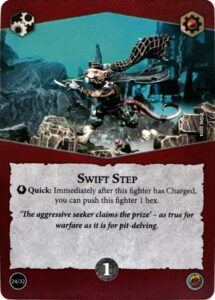
Great Speed
Additional move is important for a deck that wants you to move from token to token and reach distant tokens in enemy territory. Paying no glory for that extra speed is even better.
Power: 2
Consistency: 3
Universality: 3
Swift Step
Pushing after a charge can be very handy to help you get onto an objective token, move away from an enemy you failed to drive back, or just open up a little more distance.
Power: 2
Consistency: 3
Universality: 3
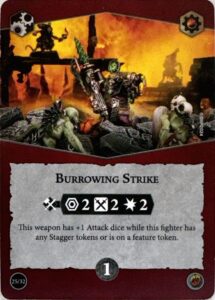
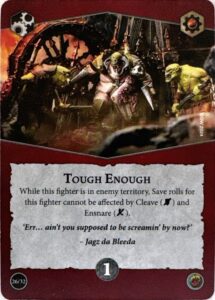
Burrowing Strike
2 Swords is a mediocre attack and getting up to 3 swords in certain positions isn’t exceptionally exciting, but dealing 2 damage at range 2 is quite nice and for more horde warbands or those with weaker fighters this is a very useful upgrade. There are many situations where we will want to attack from feature tokens or be staggered after delving with this deck, so this will often make the cut.
Power: 2
Consistency: 3
Universality: 2
Tough Enough
Ignoring cleave and ensnare is nice, and can get very rude if your fighter is on guard. The rest of the deck wants us to go to enemy territory, but overall I don’t love this card because if my opponent doesn’t have cleave or ensnare it doesn’t do anything to improve my fighters.
Power: 2
Consistency: 2
Universality: 2
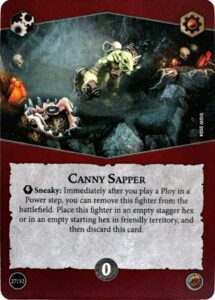
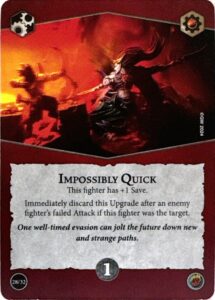
Canny Sapper
Another teleport gambit disguised as an upgrade (a 0-glory upgrade, at that!) it can help us get a fighter to safety or into a stagger hex to better use Burrowing Strike. Anything that lets me dramatically displace a fighter has powerful applications and I think frequently you will end up using the surge ability on this upgrade in the same power step in which you played it.
Power: 3
Consistency: 3
Universality: 3
Impossibly Quick
+1 save is great, but it will only ever ‘work’ once. This sort of card is hard to evaluate, as normally defensive increases can motivate your opponent to just attack a different target, but this one has a bit of a mindgame where if they take a swing and miss, the upgrade breaks. That said, any time my opponent whiffs an attack I am happy, even if it ultimately wasn’t because of my upgrade.
Power: 2
Consistency: 3
Universality: 3
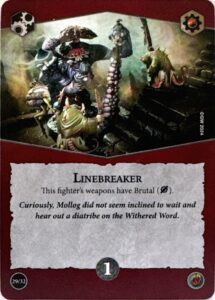
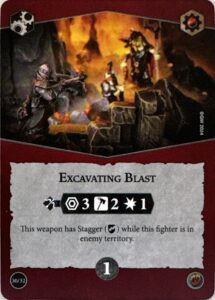
Linebreaker
Brutal seems like such a niche effect to me. I generally prefer to attack in a way that will not grant my opponent the benefits of flanked/surrounded, and if my opponent is in cover, typically they will be staggered from delving. I may come around on this, but for now, this just seems like a waste of an upgrade slot – especially because it competes with other weapon ability runemarks.
Power: 1
Consistency: 1
Universality: 2
Excavating Blast
Ranged attack action upgrades can often be very useful for warbands that otherwise lack ranged options, and for opening up more angles to charge from alone this card has a place in the deck. The ability to sometimes stagger enemy fighters doesn’t really move my opinion up or down, but I think most warbands that don’t already have ranged weapons on their fighters will take this card.
Power: 2
Consistency: 3
Universality: 2
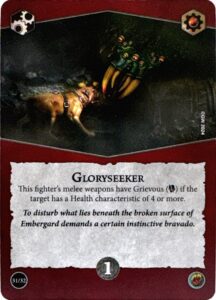
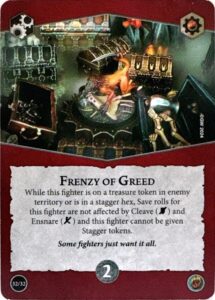
Gloryseeker
Grievous is likely to be a very valuable runemark but some warbands may have fighters who already have or gain this on their attack profiles. The constraint that it only benefits attacks against 4 wound fighters is generally negligible, as typically you don’t need +1 damage against weaker enemies anyway. I think this card is going to be a bit less exciting than its namesake but is still an effect I’m likely to windmill slam into most decks, depending on the warband.
Power: 3
Consistency: 2
Universality: 2
Frenzy of Greed
I’m not quite sure about this card – ignoring cleave and ensnare, as discussed above, is nice but niche. Being unable to gain stagger tokens could be good, but as this might also prevent you from delving, and that is a massive drawback for this deck in particular.
Power: 2
Consistency: 1
Universality: 2




